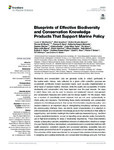Blueprints of Effective Biodiversity and Conservation Knowledge Products That Support Marine Policy
| dc.contributor.author | Weatherdon, LV | |
| dc.contributor.author | Appeltans, W | |
| dc.contributor.author | Bowles-Newark, N | |
| dc.contributor.author | Brooks, TM | |
| dc.contributor.author | Davis, FE | |
| dc.contributor.author | Despot-Belmonte, K | |
| dc.contributor.author | Fletcher, S | |
| dc.contributor.author | Garilao, C | |
| dc.contributor.author | Hilton-Taylor, C | |
| dc.contributor.author | Hirsch, T | |
| dc.contributor.author | Juffe-Bignoli, D | |
| dc.contributor.author | Kaschner, K | |
| dc.contributor.author | Kingston, N | |
| dc.contributor.author | Malsch, K | |
| dc.contributor.author | Regan, EC | |
| dc.contributor.author | Kesner-Reyes, K | |
| dc.contributor.author | Rose, DC | |
| dc.contributor.author | Wetzel, FT | |
| dc.contributor.author | Wilkinson, T | |
| dc.contributor.author | Martin, CS | |
| dc.date.accessioned | 2021-09-20T10:33:44Z | |
| dc.date.available | 2021-09-20T10:33:44Z | |
| dc.date.issued | 2017-04-07 | |
| dc.identifier.issn | 2296-7745 | |
| dc.identifier.issn | 2296-7745 | |
| dc.identifier.other | ARTN 96 | |
| dc.identifier.uri | http://hdl.handle.net/10026.1/17843 | |
| dc.description.abstract |
Biodiversity and conservation data are generally costly to collect, particularly in the marine realm. Hence, data collected for a given—often scientific—purpose are occasionally contributed toward secondary needs, such as policy implementation or other types of decision-making. However, while the quality and accessibility of marine biodiversity and conservation data have improved over the past decade, the ways in which these data can be used to develop and implement relevant management and conservation measures and actions are not always explicit. For this reason, there are a number of scientifically-sound datasets that are not used systematically to inform policy and decisions. Transforming these marine biodiversity and conservation datasets into knowledge products that convey the information required by policy- and decision-makers is an important step in strengthening knowledge exchange across the science-policy interface. Here, we identify seven characteristics of a selection of online biodiversity and conservation knowledge products that contribute to their ability to support policy- and decision-making in the marine realm (as measured by e.g., mentions in policy resolutions/decisions, or use for reporting under selected policy instruments; use in high-level screening for areas of biodiversity importance). These characteristics include: a clear policy mandate; established networks of collaborators; iterative co-design of a user-friendly interface; standardized, comprehensive and documented methods with quality assurance; consistent capacity and succession planning; accessible data and value-added products that are fit-for-purpose; and metrics of use collated and reported. The outcomes of this review are intended to: (a) support data creators/owners/providers in designing and curating biodiversity and conservation knowledge products that have greater influence, and hence impact, in policy- and decision-making, and (b) provide recommendations for how decision- and policy-makers can support the development, implementation, and sustainability of robust biodiversity and conservation knowledge products through the framing of marine policy and decision-making frameworks. | |
| dc.format.extent | 96- | |
| dc.language.iso | en | |
| dc.publisher | Frontiers Media | |
| dc.subject | science-policy interface | |
| dc.subject | marine policy | |
| dc.subject | knowledge exchange | |
| dc.subject | biodiversity informatics | |
| dc.subject | knowledge products | |
| dc.subject | evidence-based conservation | |
| dc.title | Blueprints of Effective Biodiversity and Conservation Knowledge Products That Support Marine Policy | |
| dc.type | journal-article | |
| dc.type | Review | |
| dc.type | Journal | |
| plymouth.author-url | https://www.webofscience.com/api/gateway?GWVersion=2&SrcApp=PARTNER_APP&SrcAuth=LinksAMR&KeyUT=WOS:000457690600096&DestLinkType=FullRecord&DestApp=ALL_WOS&UsrCustomerID=11bb513d99f797142bcfeffcc58ea008 | |
| plymouth.issue | APR | |
| plymouth.volume | 4 | |
| plymouth.publication-status | Published online | |
| plymouth.journal | Frontiers in Marine Science | |
| dc.identifier.doi | 10.3389/fmars.2017.00096 | |
| plymouth.organisational-group | /Plymouth | |
| plymouth.organisational-group | /Plymouth/Faculty of Science and Engineering | |
| plymouth.organisational-group | /Plymouth/REF 2021 Researchers by UoA | |
| plymouth.organisational-group | /Plymouth/REF 2021 Researchers by UoA/UoA14 Geography and Environmental Studies | |
| plymouth.organisational-group | /Plymouth/Research Groups | |
| plymouth.organisational-group | /Plymouth/Research Groups/Marine Institute | |
| dcterms.dateAccepted | 2017-03-22 | |
| dc.rights.embargodate | 2021-9-21 | |
| dc.identifier.eissn | 2296-7745 | |
| dc.rights.embargoperiod | Not known | |
| rioxxterms.versionofrecord | 10.3389/fmars.2017.00096 | |
| rioxxterms.licenseref.uri | http://www.rioxx.net/licenses/all-rights-reserved | |
| rioxxterms.licenseref.startdate | 2017-04-07 | |
| rioxxterms.type | Journal Article/Review |


